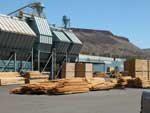| As the Wasco, Warm Springs and Paiute families of the Warm Springs Reservation had in the past relied upon the waters, the fish, and the plants and trees associated with their ancestoral homelands for their livelihood, so today the water, the fish and the trees continue to provide and sustain an entire people and way of life. And as the people were diligent stewards of these Creator-given resources, so too today the peoples of the Confederated Tribes continue to work hard to preserve and perpetuate the quality and well-being of the waters, the fisheries and the forests.
|
|
Ralph Minnick considers the state of economic conditions of the Warm Springs people prior to the inundation of Celilo Falls, pre-1957. The size and geography of the reservation are also discussed. (Interviewed by Rodney Frey, June 2003) |
When the reservation was established by the Treaty with the Tribes of Middle Oregon 1855, Wasco and Warm Springs families found they had to adapt to new ways in order to earn a living. Most families could no longer rely upon the fishing and trading associated with living along the Columbia River. And with the implementation of the Allotment Act in the 1890s (see Allotment Act), many families were forced into ranching or dry-land farming endeavors on the economically unfeasible 160-acre parcels of land allotted to them. While the allotment of lands did not have the overall disastrous consequences it had on other reservations, during these early reservation days, economic conditions were nevertheless not conducive for large-scale economic development initiatives.
For the Confederated Tribes of Warm Springs, the completion of the Dalles Dam in 1956 and the subsequent flooding of the traditional fishing sites along the Columbia River and at Celilo Falls were bitter-sweet events. While permanently denying access to the important fishing sites along the river, the federal government did compensate the Confederated Tribes of Warm Springs with a monetary payment of $4 million for their losses. In turn, the Confederated Tribes of Warm Springs have used most of that funding to invest in various tribally-initiated commercial enterprises.
|
|
Ralph Minnick considers some of the unique financial challenges in acquiring bank loans for tribal economic development initiatives. (Interviewed by Rodney Frey, June 2003) |
|
|
Ralph Minnick talks about the lumber mill, its history and operations, as part of the Warm Springs Forest Products Industries. Part 1 (Interviewed by Rodney Frey, June 2003) |
Tribally-owned and established in 1967, Warm Springs Forest Products Industries is a widely recognized industrial leader. Not only does it provide hundreds of high-paying jobs, offering critical income to scores of Indian families, but the Forest Products Industries manages the tribal forests based on sustained-yield harvest practices that are environmentally-sound.
Such practices provide for a healthy forest ecosystem, as well as a sustainable resource for future generations. With nearly half of the reservation covered with forests of Douglas fir, ponderosa pine and white fir, among other species, it is indeed a natural resource the Confederated Tribes cherish and seek to preserve.
|
|
Ralph Minnick continues discussing the operations of the Warm Springs Lumber Mill. Part 2 (Interviewed by Rodney Frey, June 2003) |
© Confederated Tribes of Warm Springs 2003
< previous | next >
|




